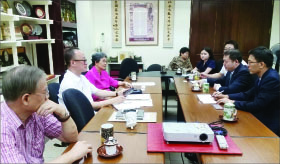
The Movement for Restoration of Peace and Order reported more cases of tokhang-for-ransom being conveyed by victims all over Metro Manila. After Senator Panfilo M. Lacson revealed at a Senate hearing Jan, 26 the 11 cases reported to him by MRPO, more victims called MRPO to share their experiences.
MRPO records showed that the victims in all cases paid ransom to avoid drug-related charges, even though they all claim not to be involved in the illegal drug trade.
Teresita Ang See said one of the 11 cases of “tokhang for ransom” took place at a hotel in Binondo on Nov. 7. The family of the Chinese national was pressured to pay P1 million. The policemen claimed they had conducted surveillance for several days on the Chinese and established his alleged illegal drug activities.
Ang See points out irregularities in the statements of the police. The victim, Chinese national Zhao Xin Min, arrived late in the afternoon of Nov. 6. He was arrested right before lunch the next day. However, the police claims the arrest was conducted in the late afternoon of Nov. 7. She said that for this case, there were several pieces of evidence to help prosecute the policemen behind the scheme, including CCTV footage taken at the hotel showing the exact time the officers “arrested” the victim.
Binondo residents also pointed out that the so-called “informants” that policemen used to entice Zhao to the hotel were the same people who were with them in their illegal drug operations. As well, another CCTV video showed the policemen withdrawing money from an automated teller machine using the victim’s ATM card.
On top of withdrawing Zhao’s money, the policemen demanded P1 million from his family in China. The family paid the “ransom,” but the policemen pushed through with filing drugs charges against Zhao. Zhao and his family have filed charges against the erring cops. His case was also referred on Nov. 15 to National Capital Regional Police Office chief Director Oscar Albayalde and Manila Police District director Chief Supt. Joel Coronel, both of whom were helpful and cooperative.
Ang See said there were four other cases where policemen used search warrants. “In the first incident, the policemen barged into the store of the victim, claiming the goods were fake. When the victim proved his goods were not fake, the policemen just confiscated them and threatened to file charges of possession of illegal drugs against him, saying his store was just a front for peddling illegal drugs.” Ang See said the storeowner was taken to the police station, but he sought help from the MRPO officials, prompting the victim’s imme-diate release. “He was freed but the policemen still demanded P100,000. The victim just gave them P10,000.”
In another case, Ang See said policemen took the victim and detained him at a police station in Ongpin.
The 11 cases came to light following the slaying of South Korean businessman Jee Ick-joo, who sought assistance after he was taken into custody by policemen for his alleged involvement in the illegal drug trade.
Jee was kidnapped in Angeles, Pampanga on Oct. 18. Policemen detained Jee with a fake arrest warrant, intending to hold him for ransom, but killed him by strangling him the same day. They managed to extract a P5 million ransom payment from Jee’s family without telling them Jee was dead.
Meanwhile, 44 members of the Angeles City Police Station 5 were relieved of their duties following the formal filing of a case against the se-ven police officers accused of illegally detaining and extorting money from three South Korean tourists. Philippine National Police chief Ronald dela Rosa also punished seven of those confirmed as “arresting” officers of the three Koreans by having them do push-ups for a straight 10 minutes.
As part of MRPO’s efforts in curbing this recent spate of tokhang-for-ransom, the group calls on the Chinese embassy to help in convincing their nationals to cooperate in the investigation, citing the efforts of the Korean embassy to cooperate with the authorities in helping solve the case of Jee.
“The Korean embassy went out of their way to help solve the case. But in the case of kidnap extortion involving Chinese nationals, maybe the Chinese embassy should also call for help like what the Korean embassy did if it involves their nationals,” Ang See said.
Other Developments
Arrested: Suspected Abu Sayyaf bandits Faizal Jaafar and Benhar Abdusalam, in Zamboanga City, on Jan. 26. Jaafar was tagged in the kidnapping of tourists from a resort in Sipadan, Malaysia in 2000. Abdusalam, a member of a kidnapping ring based in Zamboanga Sibugay, is allegedly involved in the kidnapping of Italian priest Giancarlo Bossi, Irish missionary Michael Sinnott and public school teachers in Zamboanga del Sur and Zamboanga Sibugay.
Kidnapped: Three Indonesian fishermen, by suspected Abu Sayyaf militants, off Tawi-Tawi, on Jan. 18. A speedboat with gunmen on board intercepted a Malaysian-flagged fishing boat with three Indonesian sailors on board.
Rescued: Dolcesimo Almires and Esteban Janamjam, by elements of Joint Task Force Sulu, in Indanan, Sulu, on Jan. 19. The victims were abducted by armed men on Oct. 25, 2016 while on board their boats off Pangutaran, Sulu and were held by the Abu Sayyaf group.
Released: South Korean Park Chul Hong, 38, captain of Korean vessel M/V Dong Bang Giant; and his Filipino crew member Glenn Alindajao, 31; by the Abu Sayyaf group; in Sulu, on Jan. 14. The victims were taken near the coast of Bongao, Tawi-Tawi in October 2016. A P25-million ransom was reportedly paid for their release.
